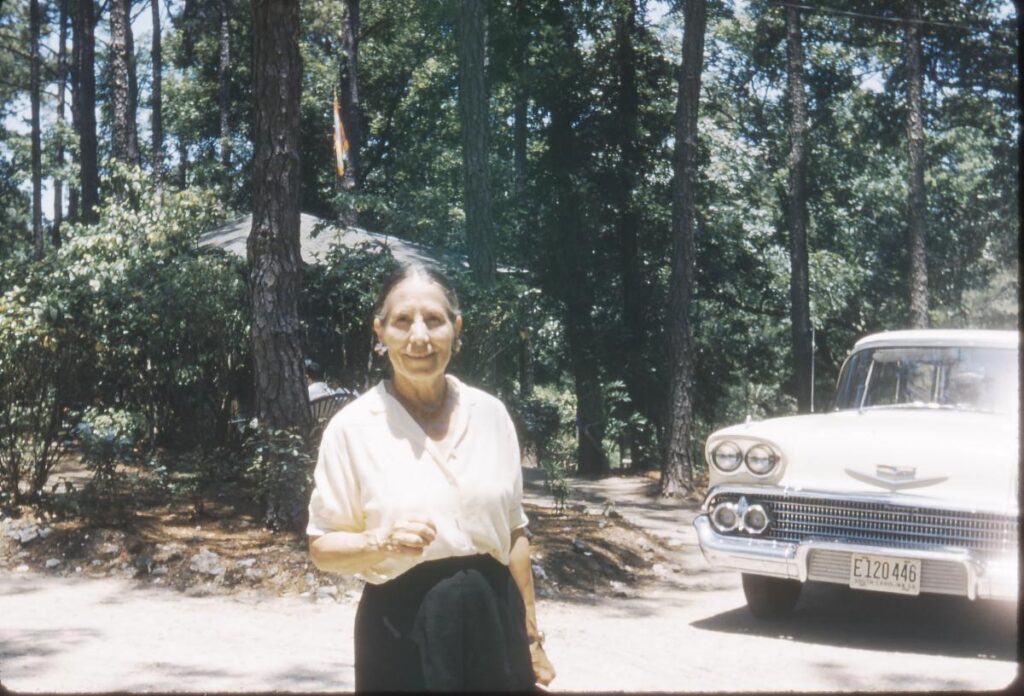
August 28, 2020
What Kitty Wanted
Talk to Baba lovers who first came to the Center in the 1970’s, and they’ll tell you about Kitty. She was a constant presence—zipping around cheerfully in her golf cart, attending evening programs, or, most frequently, sitting in her office while an endless stream of friends, new and old, sought her companionship and advice. She was enthusiastic, earnest, engaged, and her frequent unintentional word substitutions (dubbed “Kittyisms”) have us laughing to this day. Most of all, she was an example of a life lived for God.
But Kitty’s seemingly inevitable presence at the Center is a story not only of stalwart cheer and enthusiasm, but of obedience and heartache. Kitty met Baba in England in the early 1930’s, and He called her to live in India with Him and His other women Mandali in 1936. By the time of her first visit to Meher Center with Baba in 1952, she had lived in India for sixteen years, cooking, cleaning, experiencing endless and sometimes humorous challenges, and the ever-present secret joy of nearness to the One she loved.
But Kitty had learned that life with the Master meant putting His wishes first. So when, upon leaving the Center that Spring of 1952, Baba said He wanted Kitty to stay behind and help Elizabeth in the work of the Center while He and the rest of the women went back to India, Kitty unhesitatingly said, “yes, Baba.”
She got to work immediately, as Baba would want. She cared for Norina Matchabelli, who was suffering grave medical issues and couldn’t be left alone. In her spare moments, she cleaned cabins and even whacked down bushes to ensure the Center looked tended to (interestingly, one of her favorite jobs). And when Baba came back in 1956, Kitty assumed her work was done, that she would resume her life with Him and the other women. His matchless presence filled the Center. Her bags were packed. But then He left without her.
While Kitty was living in India, there had been two Hindi words that Baba emphasized over and over and over again: “Jaane do”— “Let it go.” A conflict arose: let it go. A minor inconvenience: let it go. A dashed hope, a deep suffering: let it go.
Baba came again in 1958, and again, Kitty’s bags were packed. Again, He left without her. Again, she continued her work cheerfully and tirelessly.
Then, in 1962, Kitty journeyed to India for Baba’s East-West gathering. She was finally back home, and she was sure Baba would ask her to stay. And He was luminous, His love and presence overpowering. It poured over Kitty and the thousands of other pilgrims who had come to see Him. But, when she finally stood in front of Him, He sent her back to Myrtle Beach. And then she knew.
Kitty said it was the saddest moment of her life, the moment she realized that she would never again live with Baba—and, as it turns out, the last time she would ever see Him in the body. Crestfallen, she returned to the Center, and admits that, for some time, she felt depressed.
But Kitty kept working, and reflected more and more on something else Baba had taught in the ashram. At the East-West Gathering, He even said it twice. “This is not me,” He gestured, pointing to His physical form. “It’s only a cloak I put on in which I come to visit you. Look within, that’s where I am. I am none other than the Highest within you.” Then He repeated it, seriously, pointing to the hearts of those surrounding Him. “Look within. That’s where I am.”
In 1963, Kitty received a cable from Baba: “Kitty / By being where I want you to be you are nearer and dearer to me. My love to you today and always. / Baba.”* Those words lodged in Kitty’s heart, solidifying what she already knew. In 1969, Baba dropped His physical form.
And then, in the 1970’s, the young people started flooding in, waves of them. And they came to Kitty, and the questions they asked her were: How do we love Him? How do we be with Him when we can’t be with Him physically? And Kitty, from her years with Baba and her years of separation, dipped into her experience of longing and togetherness, and told them.
The day after Kitty first met Baba, in 1931, Baba turned to her suddenly and asked, “Is there anything you want?” From somewhere deep within, Kitty found herself responding: “Yes Baba, only two things have I always desired: An increased capacity to love and increased opportunities for service. And,” she added as an afterthought, “oh yes, spontaneous goodness.”** Looking at Kitty’s life, her service, her dedication, and her shining example of Baba’s limitless love, it’s clear that He gave it all.
*Love Alone Prevails, Kitty Davy, Pg. 604
**Love Alone Prevails, Kitty Davy, Pg. 14